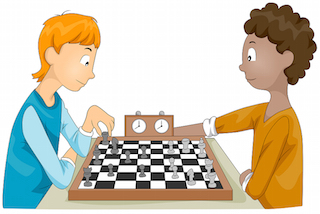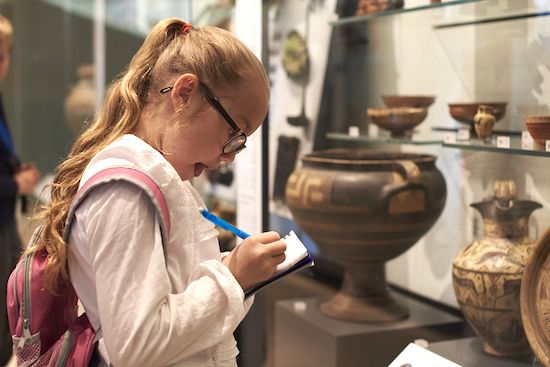Refreshing Advice for New History Teachers
A MiddleWeb Blog

What follows in italics is a final list of advice I gave these soon-to-be history teachers at the end of the semester. Below each piece of advice are my reflections based on my last three years in the classroom as a middle school teacher.
- There is a world of difference between being “cool” and being a “cool teacher.” Be “cool” on your time. Be the “cool teacher” at school.
This one came partly from my experience with a student teacher I was supervising who got into trouble. He was swearing—regularly—in class with students. I’m sure that some of his students thought that made him cool. But at least one of them didn’t, because she reported it to the principal and that student teacher was dismissed from the program.
The other problem I recognize now that I am older is this: relying on one’s youth is not sustainable. First, it is superficial. But more important, it is fleeting. Connect with them because you care about them as individuals. Connect with them as a mentor, as an older and wiser adult in their lives—even if you’re only a decade older.
- Get to know your students. Have a sense of humor. Remember that even the kids who annoy you the most have parents who love them and think they are the greatest – or other teachers who see a side of them that you do not. Even the kids who are failing your class are good at something. Remember that, like you, they have lives outside of the classroom and things that get in the way of school.
A few years ago I had a student who did little in class. She struggled to pay attention, rarely completed homework and didn’t seem to study for tests or quizzes. But boy, could she sing!

And I find this makes them try harder in class. Knowing that in addition to responding to an assignment on the causes of the Civil War, a student might have a band performance, or problems at home or in their personal life, helps me acknowledge that they are people and not just students.
- Your reason for teaching something should never just be because it is what comes next in the book. Even very good textbooks are flawed and should never be the guiding force in planning. Your lesson will be better if you can answer the question, why do we need to know this? And you ought to believe in your own answer.
One of my biggest pet peeves is when a teacher names a unit by a number. I asked a student teacher once about where a particular lesson fit in, and her answer was, “We are on Unit 5.” This told me absolutely nothing. What is unit 5?! A unit should be about something – something your lesson entails
Similarly, don’t just teach a topic because it is in the textbook. By design, textbooks tend to cover just about everything, though superficially. Just because the textbook mentions something doesn’t mean you need a whole lesson on it. You only have 170 (give or take a few) days of teaching. You cannot cover everything. Cover the parts that matter. And the things that the textbook leaves out are often some of the things that matter most.
- Students should have at least a few primary sources to grapple with throughout a unit. Otherwise, they are just reading about history instead of drawing their own conclusions. Ideally, every day in your class, students should be doing some reading, some writing, and much thinking. Ask yourself often whether or not that is happening.
I still need this reminder. Every unit? I got that covered. Every day? That’s tougher. One of my summer projects is to go through each lesson (yes, I do this every summer) and look for places where I can make students do more of the heavy lifting.
- Make use of the arts—music, literature, art, poetry. All the social sciences study how humans live. And humans do not live without the arts.
There is not a history lesson that can’t be enlivened with a little music or a poem to start things off – or an intriguing image to bring the past alive. Adding these things will enrich your lessons and help students better appreciate the song, painting, poem or novel because they will understand the historic circumstances that created it.
- You should teach things that are controversial often, because the social sciences are controversial. If there is no controversy, you are probably teaching things too superficially.
One of the things I have come to appreciate about middle school students is that they really want their voices heard and to be taken seriously by adults. They want their teachers to ask them challenging questions (even as they complain about having to work so hard), and they want to offer their opinions.
- History is full of drama, both comedic and tragic. Teach your students about battles won and lost. Teach them about the victories, the heroic, about what is possible. And teach them about opportunities lost, injustice and disasters. And in between, you can tell them good stories. There are plenty of good stories.

Whether it’s the one about young Theodore locking his future wife Edith in the closet as Abraham Lincoln’s funeral procession passed, or that Secretary of War Henry L. Stimson might have taken Kyoto off the list of consideration for cities on which to drop the atomic bomb because he had been there on his honeymoon, intriguing stories bring the past to life.
- If you do not find a historical subject interesting, neither will your students. And if you don’t find it interesting, it is probably because you don’t know enough about it. Read. Read a lot. The more you read about your subject, the better your teaching will be.
As Abraham Lincoln said, you can fool some of the people all of the time, and all of the people some of the time, but you cannot fool all of the people all of the time. There is no website, no book, no blog that can substitute for true knowledge about your subject.
This is the hardest tip of all. It is hard because it points out that there are few shortcuts to good teaching. There isn’t some sure-fire method that one can quickly apply to a topic in history, because first you have to know the history.
There are certain topics I used to dread teaching because I really didn’t know that much about them. Certainly, there are still some topics and eras that I prefer over others. But at this point in my career, I can honestly say that my favorite unit is whatever unit I am on. It took me a long time to get there. Not every lesson is my favorite. But maybe one day. . . .




































I hear you loud and clear. I also teach U.S. history at a progressive school for gifted and talented kids in Ca. Sixth grade, but I use curriculum that I have developed over the past 8 years that normally is taught at the 8th grade level. What you say is so true, in each of your examples. Keep those kids involved; make history come alive!
Thanks so much for reading and commenting. I’m glad this resonated with you.
great advice! I’m not a new teacher but will be mentoring one this fall, and I could use reminders every now and then too :)
Thanks! I find it rather humbling to realize how much of my own advice I need to be reminded of!
I would add “Cut things” I spent too much time trying to cover topics and not enough time diving deeper and getting immersive. It’s what I would change if I could go back and do it again.
Great point, Shawn. New teachers tend to use textbooks as a guide to what they should be covering. And because textbooks tend to “cover” (“mention” might be the better word here) too many things (and often leave out important things), we have to be more conscientious about what we leave in and what we leave out. As the historian Howard Zinn said, “One must inevitably omit large chunks of what is available in historical information. But what is omitted is critical in the kind of historical education people get.”
Check out these blogposts for more on this topic:
http://ushistoryideas.blogspot.com/2016/06/the-first-half-of-us-history-how-to-get.html
http://ushistoryideas.blogspot.com/2015/01/second-semester-importance-of-good.html
This was very inspiring, as a History teacher for the last fifteen years even I have loved telling stories related to the era I was teaching. I so agree with you when you mention the teacher being the greatest source of information with respect to the content and for its enhancement with music, poetry even perhaps an act or a dance! History is what we live through whether to unlearn the mistakes of the past or learn values, the lesson should be enjoyable. Would like to hear more from you!!